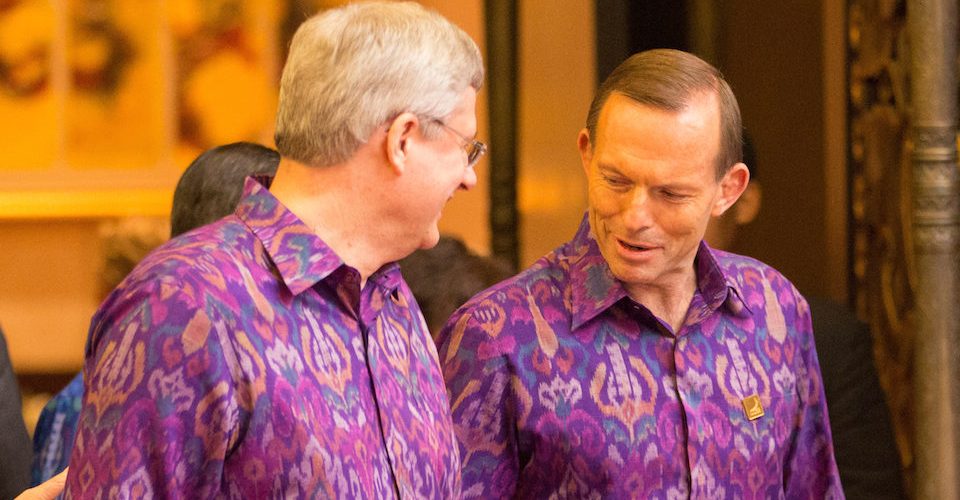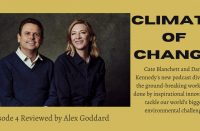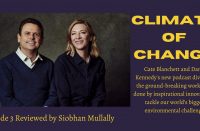Canada and Australia have so much in common that they might be twin nations separated at birth. Both are large democratic, English-speaking, settler nations, thinly populated, prosperous, resource rich and politically moderate. They have multi-party, representative systems and historically have had strong environmental movements. Yet both have lately elected extreme conservative governments hostile to climate action and environmental protection in pretty much any form.
Canada and Australia have so much in common that they might be twin nations separated at birth. Both are large democratic, English-speaking, settler nations, thinly populated, prosperous, resource rich and politically moderate. They have multi-party, representative systems and historically have had strong environmental movements. Yet both have lately elected extreme conservative governments hostile to climate action and environmental protection in pretty much any form.
Each exists in the shadow of one of the two largest economies in the world. Both of those neighbouring giants have recently stepped up their game on dealing with climate change, which may be important to the long-term economic future of Canada and Australia given the all-in on resource extraction approach of the Harper and Abbott governments. The US and China, in the longer term, just may not be buying what we are selling. Solar and wind energy and improved efficiency look a lot better than coal or tar sands oil, the dirtiest of fossil fuels. Those are better left in the ground.
From a global perspective, Canada and Australia turning away from their generally positive environmental records could not have come at a worse time. Last month, President Obama ordered a 30 per cent reduction in carbon emissions from coal-fired power plants, enough to reduce overall US emissions by 10 per cent. The next day, China anticipated an imminent (2016) absolute cap on total carbon emissions. One cannot avoid assuming that these announcements were coordinated – and timed to lead up to the 2015 global climate meetings.
It is behaviour like this that takes governments from simply being wrong to outright undermining their nation’s reputation.
With America and China at long last joining with Europe and other nations, a window for collective global action on climate is open, at least for now. Canada and Australia seem determined to close that window and scuttle a truly global initiative just when it might finally happen. It is behaviour like this that takes governments from simply being wrong to outright undermining their nation’s reputation. Citizens of both countries might consider placing bags over their heads. Having too many political parties to avoid electing the one national party devoted above all to fossil fuel extraction and export is no excuse.
New best friends
Prime Minister Abbott met with Harper in Ottawa last month to preen in each other’s company as new best friends. Each PM was at the time forcing through projects so environmentally awful as to defy comprehension. Abbott was pushing through a massive coal export terminal on, of all places, the Great Barrier Reef (Australia’s greatest natural feature). Since then, as a crowning achievement, Australia became the first country in the world to repeal an established carbon tax.
Meanwhile, Harper was about to approve the widely disliked Northern Gateway pipeline and oil tanker route through pristine wilderness and a globally treasured coastal region. While both Northern Gateway and Australia’s coal terminal have been approved, it appears, however, that neither PM will get his way on everything.
Both governments seem to want to turn back the clock on environmental progress.
The Australian Senate has twice rejected Abbott’s attempt to eliminate the Clean Energy Finance Corporation. To Canadians, of course, a functioning and effective senate seems a novel idea. However, we have instead a very effective Supreme Court. Recently, the Court broadly interpreted First Nations’ rights regarding lands that they have used for centuries, even where they have not necessarily continuously resided on all of it. Provincial governments and the federal government must now take their views and their rights seriously.
The pending pipelines to the West coast that the Harper government favours so intensely are no longer likely to be easily or quickly approved, if they are approved at all. Nor will the Harper government likely fare well politically in British Columbia in the 2015 federal election. Polls are not look promising for the Abbott government, either, though their election is further off.
Both governments seem to want to turn back the clock on environmental progress, but it is hard to believe that rejecting climate action will appeal to voters. Both Harper and Abbott have also slashed funding for scientific research, and have ignored the fact that other nations including most of Europe, the United States, China, India, Kenya, Saudi Arabia, Korea, Brazil and Japan are strongly committed to renewable energy. Ontario is as well, as are other provinces.
All things considered, Australia may be the better-looking ugly twin.
Moreover, in both countries taxpayers heavily subsidize yesterday’s economy. It is as if no one had ever heard the term stranded assets, which is what coal and tar sands oil may turn out to be. In Canada, taxpayers are also financing the ads telling us what a great job the government is doing economically. The bill for the ubiquitous Canada’s Economic Action Plan ad campaign now totals in the neighborhood of $100,000,000.
Canada ranks 55th out of 58 nations on dealing effectively with greenhouse gas emissions (followed only by Iran, Kazakhstan and Saudi Arabia). Australia came in at number 37. All things considered, Australia may be the better-looking ugly twin.
Robert Paehlke is a professor emeritus at Trent University where he taught environmental policy and politics for 35 years. About 40 years ago, he envisioned a magazine that was both scientifically sound and journalistically interesting, and Alternatives was born. “Bob P,” as we call him, sits on the magazine’s editorial board and he contributes articles and blog posts as often as we can trick him into it.
He is the author of Environmentalism and the Future of Progressive Politics (1989), Democracy’s Dilemma: Environment, Social Equity and the Global Economy (2004), Some Like It Cold: The Politics of Climate Change in Canada (2008) and Hegemony and Global Citizenship (2014).












